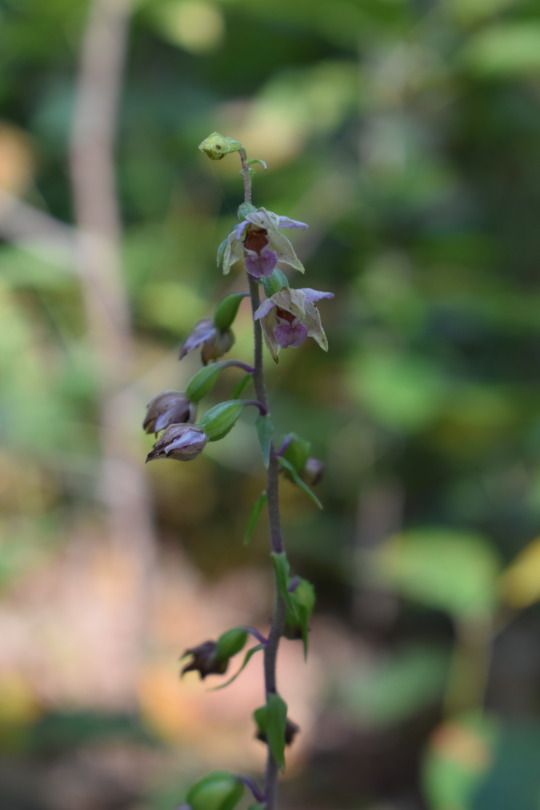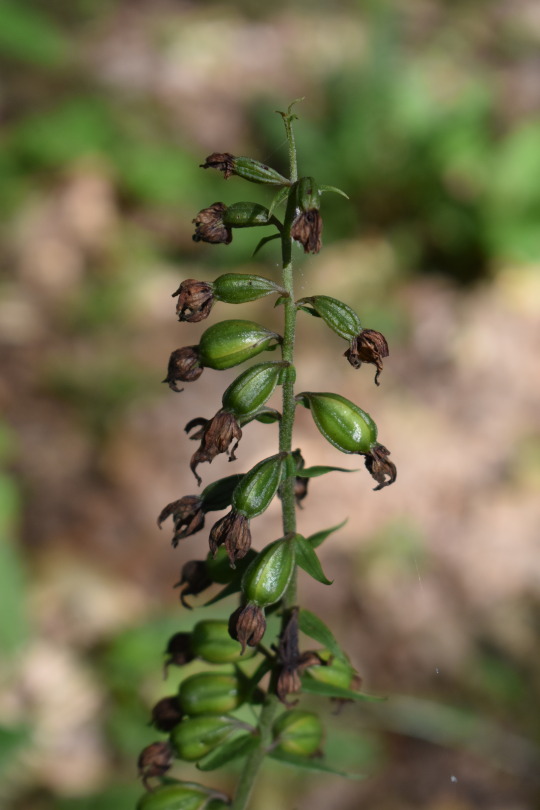#Epipactis
Explore tagged Tumblr posts
Text
One thing I love about lichen hunting is all the other organisms you get to meet on your search. We recently went on a collection trip to find rare Ricasolia amplissima in the Alps, and look at all the native orchids I got to meet!








Left to right:
Top row: Gymnadenia conopsea; Epipactis palustris; Neottia ovata
Middle row: Epipactis atrorubens; Ophrys insectifera
Bottom row: Dactylorhiza fuchsii; Platanthera chlorantha; Epipactis helleborine
229 notes
·
View notes
Text


9 notes
·
View notes
Text

Epipactis helleborine

Broad-leaved helleborine, producing narcotics without a license on main—Main Street, that is. These plants are nonnative orchids that grow as volunteers in gardens and woodlands in our area. In some places they’re even invasive but here they don’t seem to cause any problems.
At one time it was thought that only humans produced the narcotic painkiller oxycodone but no, orchids, the plants that seem to go to any length to get pollinated without having to produce sweet nectar, came up with it before we did, at least in this case. Botanists noticed wasps behaving strangely after sipping the liquid in the little cups the flowers provide and when they tested it they found several interesting compounds including oxycodone (and poisons that would make it dangerous for us to try). Some of the chemicals attract pollinators with their scent and the oxycodone and maybe some of the other substances cause the pollinators to stumble and linger, making them more likely to pollinate the flowers!
There’s a study but I’m having trouble pasting it here, definitely showing oxycodone in the nectar. Does it’s addictiveness raise pollination rates? I’m sure it’s being looked into. Meanwhile wasps in my town are feeling no pain. Edit: Here's the link to the study: https://www.aloki.hu/pdf/0302_029038.pdf Thank you to @enbynaoto for that!
106 notes
·
View notes
Text


Broad-leafed Helleborine Epipactis helleborine Orchidaceae
Photographs taken on July 21, 2023, at Mono Cliffs Provincial Park, Mono, Ontario, Canada.
#wildflowers of southern ontario#Broad-leafed Helleborine#pink#broad leafed helleborine#Epipactis helleborine#Epipactis#Orchidaceae#wildflowers#wildflower#flowers#flora#Mono#Mono Cliffs#Mono Cliffs Provincial Park#provincial park#Ontario#Canada
24 notes
·
View notes
Text


Epipactis helleborine - broad-leaved helleborine orchid
#mine#nature photography#original photography#wild orchid#epipactis helleborine#broad-leaved helleborine#july 2023
16 notes
·
View notes
Text

Epipactis helleborine, the broad-leafed helleborine, a type of orchid. Sometimes called the "weed orchid" because it pops up everywhere and is difficult to eradicate. Non-native but naturalized to North America.
#Bruce Trail#Cape Chin#Niagara Escarpment#Bruce Peninsula#Lake Huron#Georgian Bay#Bruce County#Ontario#Canada#hiking#hiking trail#forest#trees#wilderness#outdoors#Epipactis helleborine#broad-leafed hellebore#photography#digital photography#DSLR#Canon 6D#photographers on Tumblr#orchid#plant#vegetation
2 notes
·
View notes
Text



Plant of the Day
Wednesday 22 March 2023
Rosettes of toothed yellow-green bracts surround the tiny yellow flowers of Hacquetia epipactis (broad-leaved sanicle) as this low clump-forming perennial greets the early spring.
Jill Raggett
#Hacquetia#broad-leavedsanicle#greenflowers#yellowflowers#bracts#lowgrowing#plants#springflowering#writtledesign#gardens#horticulture#garden#suffolk#PlaceForPlants
187 notes
·
View notes
Text


Epipactis helleborine
9 notes
·
View notes
Text

E – Epipactis helleborine (L.) Crantz – Elleborine comune (Orchidaceae)
59 notes
·
View notes
Text
Orchids of Doriath
I love doing general flora and fauna posts but I can’t fit everything in them so I’m trying to make more specific ones as well! please please feel free to send categories to work on with locations! Or any environmental world building asks!
Note that while I have many specific headcanons about the environment of Doriath, I’m always happy to take suggestions or write environment posts based on specific places (like I did with the Havens based on Southwest Australia)
Ferns of Doriath, Mosses of Doriath, Flowers of the March of Maedhros
Orchids are beloved and unique family of flowers due to their wide range of species, fascinating ecology (many grow exclusively upon other plants and obtain moisture from them, some are even parasitic, etc) and beautiful appearance. They grow throughout the world in tropical, subtropical and temperate climates
In the real world, they hold significance in many cultures, sometimes signifying elegance, growth, beauty, or in rare cases, meanings related to the parasitism of some species.
In Doriath, orchid species grow in all parts of the kingdom, in all forests. They also grow both in and around Menengroth with several species brought and cultivated by Melian herself.
Here are my thoughts for a collection of species inspiration for Doriath
and, like my post on ferns, I am going to add some world building notes at the end so it's not just listing species
Region:
Many orchids prefer calcareous soil (I’ve written before about how Region with its Holly trees and caves likely has high alkaline) so many species of orchids grow in Region
The green winged orchid grows in grassy knolls around the alkaline soil of Menengroth. The early spider orchid grows on the banks of Esgalduin near the entrances to Menengroth along with green flowered helloborine and dark red helloborine.
Lady slippers orchid grows in the more open spaces as well as the greater butterfly orchid.
Heath spotted orchids grow by streams.
The early purple orchid grows mostly in Region and Neldoreth. The lizard orchard is found in Region and Nivrim in more open areas
Neldoreth
White helloborine grows primarily in Neldoreth but can be found around Menengroth in Region too. It prefers beech forests. Red helloborine grows only in the drier parts of Neldoreth and green flowered helloborine grows in Neldoreth and Nivrim.
Three toothed orchids grow in Neldoreth and occasionally in Nivrim
Bird’s nest orchids also favor beechwoods and so grow in Neldoreth Lesser butterfly orchids grow primarily in Neldoreth but occasionally grow in Region too.
Nivrim:
White egret flowers can be found in the marshes south of Nivrim
Sword leaved helliborine lives in swampy forests and so grows throughout Nivrim. Violet birds nest orchid grows in Nivrim as does lizard orchid
Yellow bee orchids live in the drier areas of Nivrim along with Epipactis tremolsii.
Nivrim, Region and Neldoreth
Pale orchids grow in open spaces and by the waters
Common twayblade grow in drier areas
Arthórien: ( I headcanon that Arthórien has a markedly different climate than the rest of Doriath for a number of reasons: the cultivation and practices of the green elves who live there, slightly different elevation (based largely on my own speculation), the rivers, and some intervention by Melian. )
Aerides lawrenceae grows in the forests here as does Acampe rigida Common Christmas orchid, blood stained dendrobium
Marsh helloborine, soldier orchids and fairy orchids grow by the waters and winter orchids grow in more open spaces.
Creeping forest orchids grow here and occasionally over the river in Neldoreth.
All:
Ghost orchids grow sparsely throughout Doriath . Musk orchids more commonly so as do species of wide lip orchids
Bog orchids grow by the rivers and in marshier areas of all four forests
Significance to the Sindar and Nandor of Doriath:
It's interesting to note that no word for orchid appears in any of Tolkien's languages. I was surprised to find this as they are such a wide and varied family of flowers and he was so interested in botany! So any of the notes on language here are my own headcanon. I have not yet come up with a word for them in Sindarin yet (I probably won't be able to do Nandorin as our knowledge of it is much more limited) but I will try to!
Orchids are beloved by the elves of Doriath. A number of species grow within the sacred gardens of Menengroth and others are specially cultivated by the servants of Melian. Species like bee orchids are only found in the gardens of Menengroth and the servants and students of Melian often experiment with their pollination and cultivation, sometimes creating new varieties.
Orchids in the Sindarin language and knowledge are distinguished by their unique petals and stems and asymmetrical bodies as well as their behavior and pollination patterns. Their growth is sometimes associated with places of magic and twilight
Though the flowers themselves are not disliked by the Silvan elves, some of their number in Doriath associate the natural growth of orchids with places of tragedy. They are also associated with transitional ecosystems and with shadier parts of the woods.
As always please feel free to ask more. I love talking about ecology stuff and the relationship of people and elves to the natural world
57 notes
·
View notes
Text

6 notes
·
View notes
Text

Skovhullæbe - Epipactis helleborine
27 notes
·
View notes
Text


Broad-leafed helleborine Epipactis helleborine Orchidaceae
Photographs taken on August 13, 2023, at Pinery Provincial Park, Ontario, Canada.
#wildflowers of southern ontario#pink#Orchidaceae#orchid#Broad-Leafed Helleborine#helleborine#broad leafed helleborine#Epipactis#Epipactis helleborine#wildflowers#wildflower#flora#flowers#nature
15 notes
·
View notes
Text

Dark red helliborine (Epipactis atrorubens) Derbyshire, England. 17th July 2024.
3 notes
·
View notes
Text

I’ve been seeing the stalk and leaves all year and I finally caught this epipactis helleborine flowering.
3 notes
·
View notes
Text
#2408 - Microtis unifolia - Common Onion-Orchid

Originally described as Ophrys unifolia, and also known as Epipactis porrifolia, and synonymised with 15 other species of Microtis.
in a planter on the footpath in New Plymouth - definitely not somewhere you'd expect an orchid, but apparently it's widespread and found in lawns, gardens, pine plaintations, mossy crevices in old buildings, etc. Sometimes a weed in plant nurseries. In the wild it can be found from swamps to rocky outcrops in semi-arid areas.
Found from south China to Japan, Malesia, and Australasia to the Southwest Pacific. It has a single green leaf and up to one hundred small green or yellowish-green flowers.
New Plymouth, Taranaki Ringplain, New Zealand.
1 note
·
View note